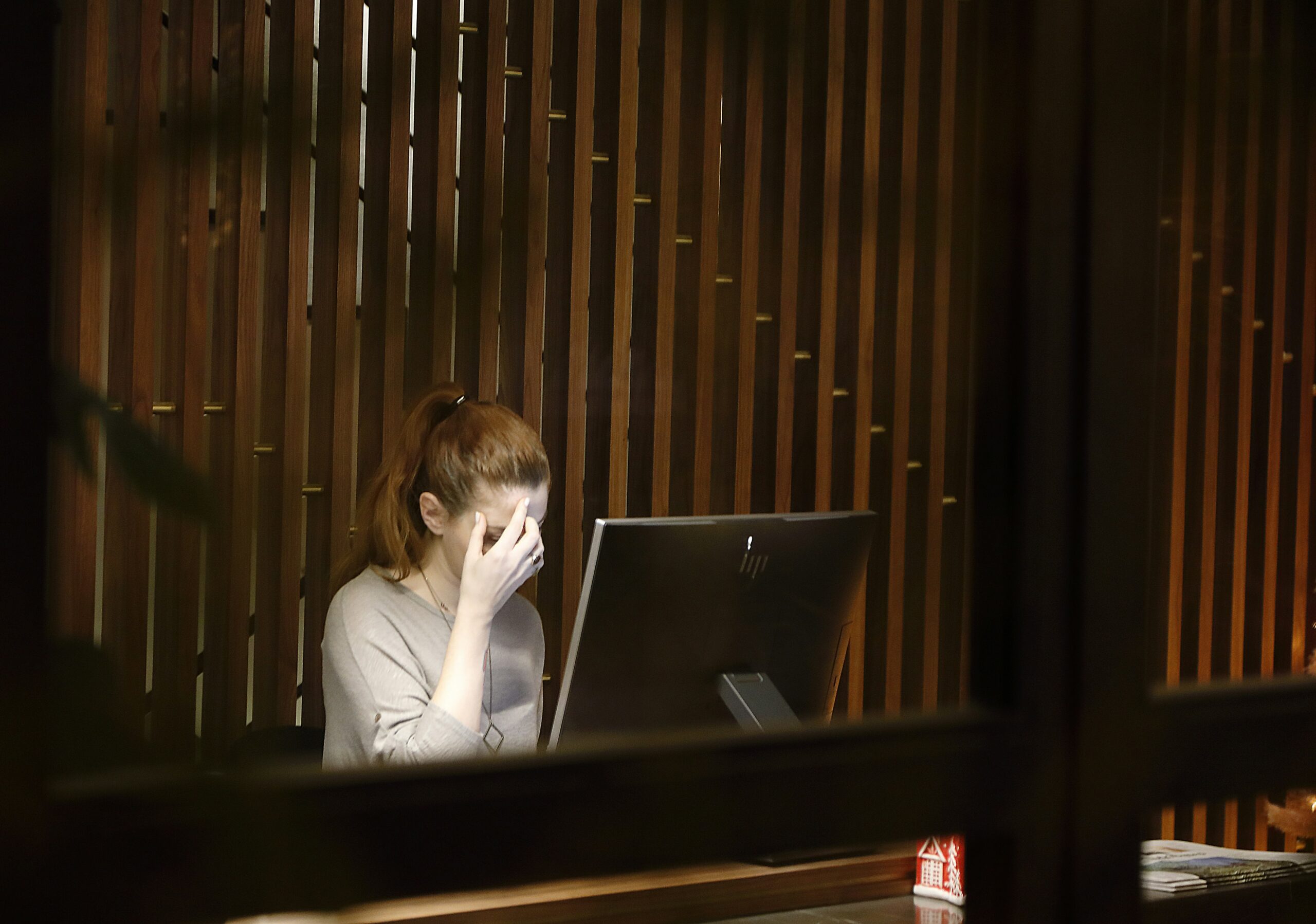Therapy is a transformative practice that can change the course of a person’s life. To further illustrate this, we wanted to share a story from a patient (with permission) who used therapy to help her recover from her eating disorder. Below is her message about the benefits of therapy.
“I started going to therapy shortly after graduating from high school when I started experiencing symptoms of an eating disorder. It was definitely a hard process to start, but once I did, it was extremely helpful. I remember my first session I sat completely silent because I was too scared. With time, I was able to connect with my therapist, and she helped me heal a lot of trauma that I had carried with me my entire life. I still partake in therapy (almost 10 years later) to help with all of life’s struggles. I would recommend it to anyone who has the ability to go.”
Living with any mental health struggle is challenging, and validating this is an important part of recovery. Living with anxiety can make you feel like you are always stressed out or on edge. This is exhausting and can lead to physical health problems as well. Constant anxiety is not a way to live, but thankfully, there are many effective treatment options available. These treatments include cognitive behavioral therapy, dialectical behavioral therapy, exposure therapy, mindfulness therapy, walk-and-talk therapy, art therapy, and movie therapy. These therapies can be used with medication and holistic therapies to treat anxiety and other mental health disorders.
Why Does Professional Treatment Matter?
Limitations of Self-Help
Self-help strategies are great to try, but might only be efficient treatments for certain levels of anxiety symptoms. If someone is trying to use self-help strategies but finds their symptoms are still persistent or even getting worse, they might need to seek professional treatment.
Benefits of Professional Guidance
Professionals can provide personalized strategies and accountability for patients struggling with anxiety. They can also use their training and knowledge to teach evidence-based treatment options that could drastically improve the patient’s life.
Cognitive Behavioral Therapy (CBT)
Cognitive behavioral therapy is a type of treatment that involves recognizing negative thought patterns and reframing them to be more accurate or positive. CBT teaches how our emotions, thoughts, and behaviors are all connected. CBT addresses anxiety by helping patients identify their anxious thoughts that might be based on cognitive distortions. Through therapy, patients can learn how to reframe their anxious thoughts, which can decrease their feelings of anxiety. CBT is effective for many different types of disorders and has a success rate of about 50%.
Dialectical Behavior Therapy (DBT)
Dialectical behavior therapy teaches skills that can help with strong emotions or mental health struggles. DBT is beneficial for people who have trouble regulating their own emotions. The core components of DBT are mindfulness, distress tolerance, interpersonal effectiveness, and emotional regulation. DBT can help with anxiety because it teaches patients to develop coping skills for when anxious thoughts arise. When a patient goes to individual therapy for DBT, they will work with their therapist to set goals for treatment. The therapist will teach the patient the core components of DBT and how to incorporate them into their lives.
Exposure Therapy
Exposure therapy helps people who have phobias or fears about different things. This type of therapy gradually exposes patients to their fears in a safe and supportive environment with their therapist. Exposure therapy is especially helpful for OCD, phobias, and anxiety disorders. There are many different ways to conduct exposure therapy.
In vivo exposure therapy
In vivo exposure therapy has the patient face their feared object or situation in real life. For example, if you had a phobia of a specific object, your in vivo exposure would involve holding the object.
Imaginal exposure therapy
Imaginal exposure therapy has the patient imagine whatever their fear is and identify the emotions that come up with it. The patient explores the emotions that come up regarding their fears and repeats this process as needed.
Interoceptive Exposure Therapy
Interoceptive exposure therapy is a type of therapy that helps patients face fears by exposing themselves to the physical reactions that come up with fear or stress. This type of exposure therapy helps patients decrease their fear of the physical reactions that come up.
Virtual Reality Exposure (VRE) Therapy

VRE therapy uses virtual reality situations to help patients face their fears in a three-dimensional space. This therapy is a newer practice and continues to be developed with technology advancements.
Mindfulness-Based Therapies
Mindfulness-based therapies can be incredibly useful for people with anxiety. Mindfulness directly addresses anxiety by teaching us to stay in the present moment, while anxiety usually involves us worrying about the future or the past. Mindfulness-Based Stress Reduction (MBSR) is a type of mindfulness-based program that teaches techniques to decrease stress or anxious feelings. This program is beneficial because it is proven to reduce anxiety, stress, and depression. While this program is more structured, there are ways to incorporate mindfulness into everyday life. You can practice mindfulness while driving, walking, eating, or breathing. Focusing on the present moment doesn’t always come naturally for everyone, so incorporating these activities into daily habits is a helpful way to practice them.
Walk and Talk Therapy
Walk and Talk Therapy combines therapeutic dialogue with physical movement. Physical exercise is beneficial for our mental health, and combining it with talk therapy can be especially effective for managing anxiety. In particular, walk-and-talk therapy can be helpful for anxiety because it typically takes place outdoors. Spending time outdoors can alleviate anxiety symptoms by promoting vitamin D intake, regulating sleep, and enhancing mood. During a walk-and-talk therapy session, a therapist discusses the patient’s goals and teaches them coping skills/methods to help, similar to a typical therapy session. This unique type of therapy helps patients also receive benefits from physical activity, including reduced stress and improved mood. This type of therapy is best for people who are physically able to participate in walking. It’s also important the patient is aware that if this therapy is conducted in a public place there may not be confidentiality guarantees.
Expressive Art Therapy
Expressive art therapy teaches patients to create art to help them work through their emotions or thoughts. This type of therapy can be helpful for people struggling with anxiety because it allows patients to use art to express their emotions. Oftentimes, people who struggle with anxiety have a hard time identifying their emotions and articulating the cause. This type of therapy helps patients verbalize things that might have been hard to do otherwise. Expressive art therapy is most commonly done in the form of drawing, painting, sculpting. It can be any form of art preferred by the therapist and patient. It’s important to work with an expressive art therapist who is trained to help patients explore the therapeutic benefits of expressive art therapy.
What is Movie/Cinema Therapy?
Movie therapy uses films as therapeutic tools to help patients. This type of therapy is especially helpful for people with anxiety who may often feel stuck in their lives; it helps them gain new insights, release emotions, and even form new perspectives or mindsets. Movie therapy involves therapists choosing movies for their patients to watch based on different themes and characters. The patient and therapist will discuss the goal of the experience, which will help determine the correct themes for a film. It’s important to tailor the films to the patient’s specific concerns whenever possible.
What is Online Therapy?
Online therapy, or teletherapy, allows patients to meet with a therapist in a virtual environment. This can be done over the phone or through video chat. Online therapy can help reduce the barriers to treatment (such as transportation and cost) for many experiencing mental health struggles. Online therapy can be used to treat most mental health concerns. In extreme cases, online therapy might not be sufficient treatment, depending on the patient’s symptoms.
Medication Management
Medication is a useful tool in treating mental health conditions in combination with other treatments. These medications are often used when patients have an imbalance in mood-regulating chemicals. Medications for mental health, including SSRIs and SNRIs, are used to help regulate these imbalances. Patients must be under medical supervision by a licensed psychiatrist or psychiatric nurse practitioner to make sure there are not any dangerous symptoms.
Selective serotonin reuptake inhibitors
Selective serotonin reuptake inhibitors (SSRIs) are medications that block serotonin from being absorbed by proteins in the brain. These medications help to regulate mood and are usually used to treat anxiety and depression.
Serotonin and norepinephrine reuptake inhibitors
Serotonin and norepinephrine reuptake inhibitors (SNRIs) are medications that block the reabsorption of serotonin and norepinephrine. While SNRIs can be used for depression, they are also used for sleep and anxiety disorders.

Holistic and Alternative Therapies
There are also holistic and alternative therapies available. Patients struggling with anxiety may benefit from lifestyle modifications such as diet, exercise, and improved sleep hygiene. All of these lifestyle modifications directly address some of the main symptoms of anxiety. In addition, there are also complementary treatments such as yoga, acupuncture, and herbal supplements that could potentially help alleviate mental health symptoms. It’s important to remember that holistic therapies are meant to enhance traditional therapies, not replace them. This is not to say there is not a place for holistic and alternative therapies, but they should not be the only form of treatment.
Our Treatment Philosophy
Our treatment philosophy focuses on client-centered care in all interactions. We will make sure that your treatment is personalized to your specific needs and goals. We also emphasize the importance of creating a supportive environment that fosters trust and confidentiality.
Success Stories
Lisa’s Breakthrough with Movie/Cinema Therapy
Before:
Lisa, a 30-year-old graphic designer, experienced social anxiety that made it difficult to connect with others. She often felt isolated and misunderstood.
After:
Lisa utilized Movie Therapy, watching and analyzing films featuring characters overcoming similar challenges. Discussing these stories with her therapist helped her gain new perspectives and strategies. She began applying these insights to her life, leading to increased social engagement and reduced anxiety.
Visual Progression:
- Before: Isolation, fear of social situations, low self-esteem.
- After: Active social life, confidence in interactions, positive self-image.
Emily’s Experience with Expressive Art Therapy
Before:
Emily, a 22-year-old college student, dealt with panic attacks and found it challenging to verbally articulate her emotions. She often felt overwhelmed by academic pressures and social expectations.
After:
Emily used Expressive art therapy by using painting and drawing to express her inner experiences. These creative outlets allowed her to process emotions that were hard to put into words. Over time, her panic attacks decreased, and she developed healthier coping mechanisms.
“Art therapy unlocked emotions I didn’t know how to express. It became a safe space for me to explore my feelings and reduce my anxiety.”
— Emily
Taking the Next Step
If you are ready to take the next step in your treatment journey, please reach out to us here. We are excited to get started and find the best way to help you. There are virtual therapy options available for those who are unable to meet in person.
We currently do not take insurance because of privacy concerns, treatment limitations, delayed reimbursement, administrative hassles, and confidentiality issues. However, can provide a detailed bill with all the information needed to receive reimbursement from your insurance.
If you struggle with anxiety, we want you to know that there is hope. As highlighted in this article, there are many effective treatment options available. We have seen many patients use these treatments to enable them to live full and happy lives. Please reach out today if you are interested in working with us. We will do everything we can to provide you with the care and support you deserve.
Frequently Asked Questions
- How long does anxiety treatment usually take?
- Duration varies, but many see improvement within 12–16 weeks of consistent therapy.
- Will I have to take medication?
- Medication is not mandatory and depends on individual needs.
- Do you offer online therapy sessions?
- Yes, we provide teletherapy options for convenience and safety.
- What is Walk and Talk Therapy, and is it right for me?
- Walk and Talk Therapy combines walking outdoors with counseling sessions, beneficial if you enjoy being active and find traditional settings restrictive.
- Do I need artistic skills for Expressive Art Therapy?
- No artistic talent is required; the focus is on expression, not artistic quality.
- How can Movie Therapy help with anxiety?
- Discussing films can provide new perspectives and help process emotions related to anxiety.
- What is Dialectical Behavior Therapy (DBT), and how does it help with anxiety?
- DBT teaches skills like mindfulness and emotion regulation to manage anxiety effectively.
Note: These success stories are illustrative examples designed to demonstrate potential outcomes of therapy. They are based on composite experiences and do not represent any specific individual. Actual results may vary, and all client information is kept strictly confidential in accordance with professional ethical standards.
Online Therapy in Florida, Idaho, South Carolina, and Utah
At Calming Transformations Counseling, our therapists understand how difficult it can be to manage anxiety, stress, depression, and relationship issues. We can help through online therapy in Florida, Idaho, South Carolina, or Utah or walk and talk therapy in Hillsborough County, Florida. Book an appointment or contact us today to schedule a session and take the first step toward a healthier, happier life. Remember, your mental health is important—take the time to care for yourself.
